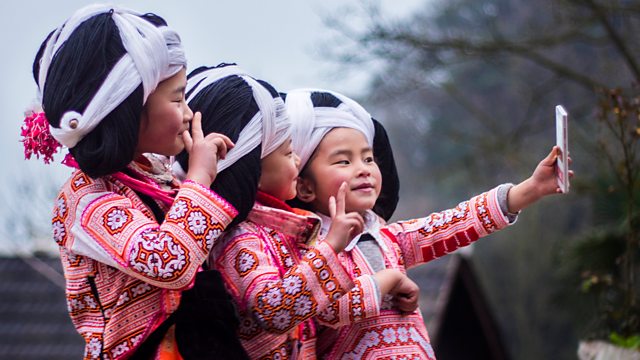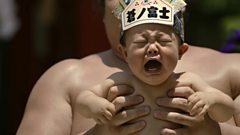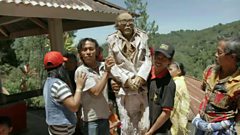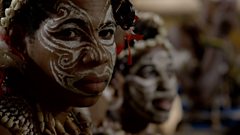
Circle of Life
A look at the world's most spectacular and extreme rituals. This episode looks at the way different cultures mark life events on the journey from cradle to grave.
On our journey from cradle to grave, we mark the most important moments of our lives with rituals and ceremonies around birth, marriage and death. These life events, and often the emotions around them, are universal. Yet across the globe we perform them in extremely different ways.
With the birth of a child, parents will do anything to protect them. In Japan a 400 year-old ceremony called Naki Sumo sees mothers hand over their babies to professional sumo wrestlers, who then compete to make them cry - all in the popular belief that 'crying babies grow strong'. In the Brazilian Amazon, the Kayapo people believe that birth is a time of great danger, when their ancestors try to steal the baby's soul back into the land of the dead. Until 20 years ago, they had had no access to modern medicine so many babies died in infancy. The family of 19-year-old Irenekwa perform rituals to protect her new-born son - bathing him with medicinal plants, piercing his ears to open his senses to the world, and painting him with the dye of a jenipapo fruit to express their love. For Irenekwa herself, becoming a mother is an important coming of age, giving her a new status in the community.
Around the world there are rituals that mark the transition from child to adult. In the UK, the American import of the school prom is increasingly popular. But in some cultures, young boys in particular still undergo ancient and sometimes brutal rites of passage to become men. One of the most extreme is in Papua New Guinea, where young men's skin is cut with the patterns of crocodile scales to represent the strength and power of an ancient crocodile spirit. John has spent six months sequestered in a spirit house, learning lessons on manhood from the elders and building up fat with the help of meals cooked by his mother Mathilda. It is preparation for the cutting ceremony, when hundreds of razor cuts are made in John's torso, each representing a bite from the crocodile spirit.
Finding a partner is often the next stage of life. In China, 21st-century teenagers perform seventh-century matchmaking rituals to find love. The girls of the Long Horn Miao wear headdresses made from their ancestors' hair in an ancient singing ritual to help them find a boyfriend. 16-year-old Jin Mei and 19-year-old Shun Dong hope the festival will help give them the courage to confess their true feelings to their secret crushes.
In our modern world where families are often separated by great distances, rituals can reunite us and bring us back to our roots. In Niger, two Tuareg families and their guests travel into the Sahara for traditional marriage celebrations. This is a modern union, based on love - the couple live and work in the city, but have chosen to follow these ancient marriage rituals in the desert. Once they are married, they plan to set up life together in Paris.
In every part of the world we honour our dead. For many of us, funerals help us say goodbye to our loved ones, but in some cultures death is just one of several stages. In Japan prayers are offered to the dead for 30 years to help release their souls into the afterlife. But in Japan's cities these rituals are being adapted for modern life. Here more and more people are living and dying alone, without family to perform key rituals. Some temples now provide a paid service to store the ashes of the dead in high-tech, high-rise cemeteries, where priests offer daily prayers. In Sulawesi, the Torajan people stage the most elaborate funerals on earth. Tadung's body has been kept at home for over a year, while his family raises enough funds - the equivalent of 拢170,000 - for the rituals. The funeral lasts a whole week, with ceremonies to secure Tadung's status in the afterlife.
The exuberant death culture of the Torajans also continues beyond the grave, with an extraordinary ceremony called Ma'nene. In a practise which is gaining popularity thanks to social media, families remove their dead relatives from their tombs to change their wrappings, show their continued love, and to send selfies to relatives living far away from home - modern technology unites them with an ancient family tradition. Around the world, even in our most familiar of customs, rituals give us meaning, binding us together for the most important moments in the circle of life.
A 91热爆 Studios Natural History Unit Production in partnership with the Open University.
Last on
More episodes
Previous
You are at the first episode
![]()
Ten ceremonies from around the world that mark key points in our journeys through life.
Clips
-
![]()
Singing for Love in China
Duration: 01:45
-
![]()
Naki sumo, where wrestlers make babies cry
Duration: 00:37
-
![]()
The most extraordinary death ritual of all, Ma'Nene, Indonesia
Duration: 02:27
-
![]()
Behind the scenes in Papua New Guinea - becoming a woman
Duration: 08:36
Credits
| Role | Contributor |
|---|---|
| Narrator | Simon Reeve |
| Executive Producer | Lucy Carter |
| Series Producer | Tuppence Stone |
| Production Manager | Bronwen Thomas |
Broadcasts
Featured in...
![]()
Documentary Box Sets
A collection of documentary box sets
Discover more about rituals around the world with The Open University
Visit OpenLearn, the OU鈥檚 home of free learning, to explore further.
Have you got what it takes to overcome the Extraordinary Rituals quiz?
Test your knowledge on rituals from around the world
Read behind the scenes stories written by the people who made the series
Get deeper insights into the critical moments in people's lives featured in this series.







